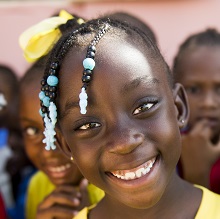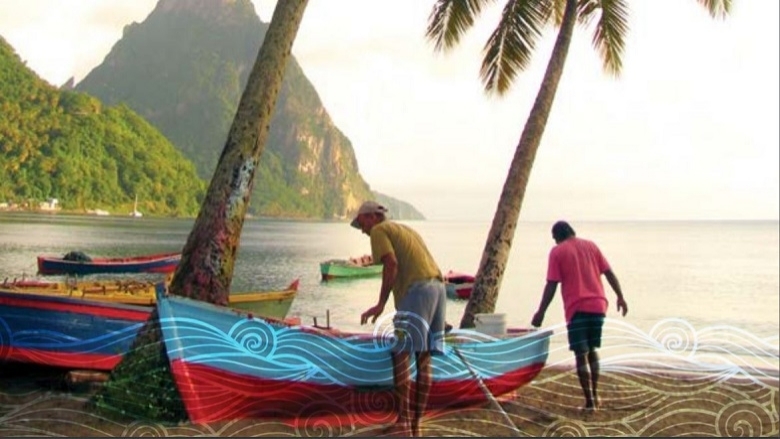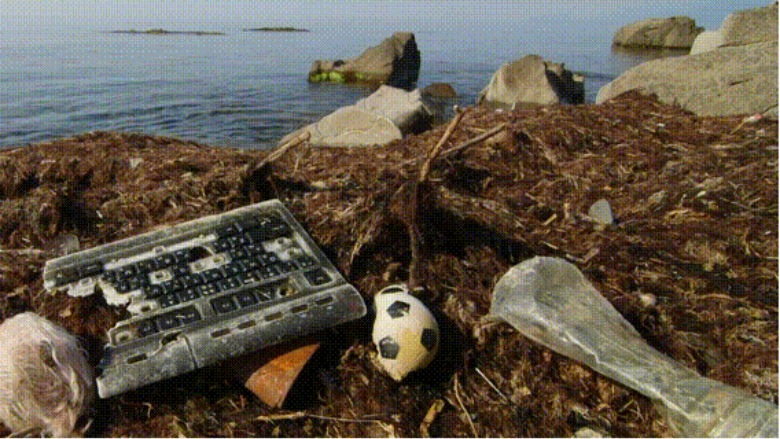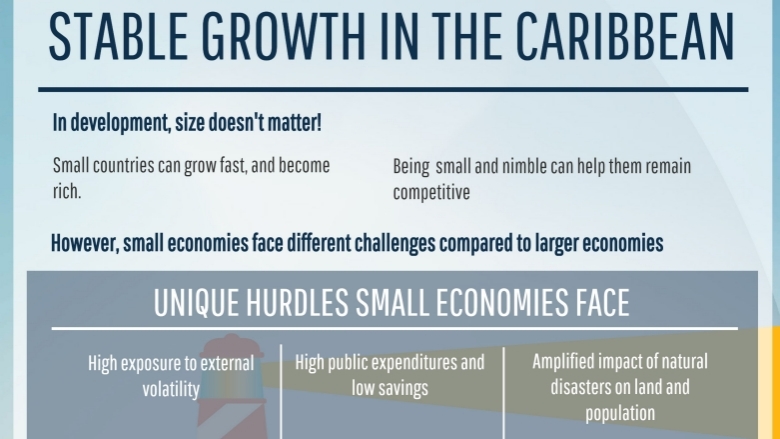Natural disasters in the Caribbean region have become increasingly intense in the face of climate change. The World Bank engagement in the Caribbean has achieved these results:
- A financial package of more than US$100 million was provided for Dominica, including through the IDA crisis response window after Hurricane Irma in 2017. Contingent credit lines, known as a Cat-DDOs, were approved in 2020 for Saint Vincent and the Grenadines and Grenada, to be disbursed during a national emergency. Two days after the eruption of the La Soufrière volcano in Saint Vincent, the World Bank disbursed the US$20 million Cat-DDO to support the response to the crisis, the first large financial assistance provided to the country following the eruption.
- There are projects to support climate resilience and enhance disaster preparedness and emergency response on the islands of Dominica, Grenada, Saint Lucia, and Saint Vincent and the Grenadines. The focus is on making infrastructure more adaptable to extreme weather events and natural disasters and improving government capacity to handle disaster risks.
- In Surinam, the Saramacca Canal System Rehabilitation Project aims to support the country to reduce flood risk in the greater Paramaribo area and improve the Saramacca Canal System. It will improve the resilience against flooding by improving the ability of the Saramacca Canal to discharge water efficiently and safely, improving vessel transport, and strengthening the government’s capacity to manage and operate the canal’s drainage system.
The Blue Economy
Harnessing marine resources while preserving the Caribbean Sea can help countries address key challenges such as high unemployment, low growth, food security, poverty, and resilience to climate change.
The World Bank report “Toward a Blue Economy: A Promise for Sustainable Growth in the Caribbean” estimates that the Caribbean Sea (including mainland Caribbean coastal countries) generated US$407 billion in 2012.
Ongoing World Bank support to building environment and natural resource resilience in the Caribbean includes:
- Banning of single-use plastics and/or Styrofoam containers across the OECS;
- Creating an insurance mechanism to include the fisheries sector in Grenada and Saint Lucia;
- Building sustainable agriculture practices and competitiveness in Jamaica, Haiti, and the OECS;
- Expanding marine protected areas in Belize and strengthening protection and climate resilience of the Belize Barrier Reef;
- Preparation of a new regional blue economy project in the Eastern Caribbean to strengthen management and resilience of marine and coastal assets.
Macroeconomic and Fiscal Sustainability
The World Bank Group is working with Caribbean governments and regional partners to help Caribbean countries better manage public spending and reduce their debts to sustainable levels, while protecting poor and vulnerable populations.
- The World Bank provided Development Policy Financing to Jamaica, Dominica, Grenada, and Saint Lucia to support reforms to support the COVID-19 response and recovery.
- The World Bank is supporting Jamaica’s ambitious reforms to strengthen fiscal sustainability and inclusion, enhance fiscal and financial resilience against climate and natural disaster risks,
- In Grenada, a series of budget support operations helped private investment, improved public resource management and boosted resilience against natural disasters.
Growth
The WBG has worked with regional partners to help Caribbean countries facilitate the private sector and trade reforms, while supporting jobs and protecting poor and vulnerable populations.
- The World Bank Group is helping improve Jamaica’s competitiveness by facilitating the growth of new and existing businesses. This includes technical assistance for public-private partnerships, ranging from airports to ports, economic zones, water generation, wastewater and sewage, schools, and renewable energy.
- The World Bank Group is mobilizing private capital for strategic investments and seeking to more fully integrate Jamaica’s small and medium enterprises (SMEs) into global value chains.
- The World Bank Group is supporting diversification of the region’s power sector by increasing the production of renewables and other clean energy sources. In the Eastern Caribbean, this involves the use of commercial-scale solar photovoltaic systems on rooftops in Saint Lucia, Grenada, and Saint Vincent and the Grenadines.
- The Entrepreneurship Program for Innovation in the Caribbean (EPIC), with support from the government of Canada, has provided tailored business development support and training to more than 2,100 entrepreneurs across sectors, including in digital and climate technologies. It has also facilitated more than US$4 million in investments raised by Caribbean entrepreneurs.
- The World Bank is supporting digital development to help diversify growth and improve public services. Digital projects are underway in the Eastern Caribbean, Haiti, and Sint Maarten.
- The World Bank is promoting governance, good international practices, and sector diversification through the Suriname Competitiveness and Sector Diversification Project. By focusing on policy, legal, and regulatory reforms in the mining, agribusiness, and tourism industries, the investment will enable private sector growth opportunities, boost job creation, and benefit more than 200 small and medium enterprises. The project is also building the capacity of key institutions and enhancing business development services.
Human Capital, Inclusion and opportunities for all
Quality education, affordable health care, and equitable social safety nets are key ingredients in building inclusive societies. In the Caribbean, several countries have launched innovative efforts to provide the most vulnerable, including children, with the knowledge, skills, and health they need to excel.
- Jamaica’s comprehensive National Strategic Plan for early childhood development is the first of its kind in the region. Jamaica is one of the few countries in the region that guarantees free pre-primary education and has the highest proportion of children enrolled in preschool. The World Bank supported the scaling-up of early childhood development services to help improve parenting, care, and school readiness for children from birth to six years of age, and to provide diagnosis and early stimulation for children at risk.
- In Guyana, the World Bank has provided long-standing support in the area of education spanning from early childhood to primary and secondary education, all the way to the University of Guyana. Curricula reform and research programs have included significant contributions from the main indigenous groups.
- In Saint Vincent and the Grenadines, support was provided to help 13,000 students and 2,000 teachers adapt to schooling during the COVID-19 outbreak. The World Bank worked with the Government to develop a COVID-19 Action Plan to guide safe reopening. School safety assessment and disaster plans were also revised to ensure that schooling could resume as soon as possible after an emergency.
- In 2021, the Bank adjusted its program to support COVID-19 response and recovery in OECS countries. The program in the region had a strong focus on building cross-cutting resilience across the fiscal/financial, infrastructure, human capital, and environmental dimensions. Hence, the active portfolio was already well placed to respond to the pandemic response priorities, including through the activation of Contingency Emergency Response Components (CERCs). Moreover, the Bank reprioritized the IDA program to support COVID-19 response and recovery, closely aligned with the Bank’s COVID-19 Crisis Response Approach on “Saving Lives, Scaling-up Impact and Getting Back on Track”.
- In Haiti, the World Bank supported improved nutrition through the provision of 5,100,000 school meals were provided to 170 public 60 community schools during the 2019-2020 school year. During the school closures caused by the COVID-19 pandemic for the months April-June 2020, 62,000 take-home food rations were provided to 82,000 students in 230 projects supported schools.
- Through a series of projects in the health sector, the World Bank has supported Haiti to contain the outbreak of cholera, through mobile rapid response teams, community-based support, and increased capacity for disease surveillance. There have been no new laboratory-confirmed cases of cholera since January 2019.
Last Updated: Oct 19, 2022






